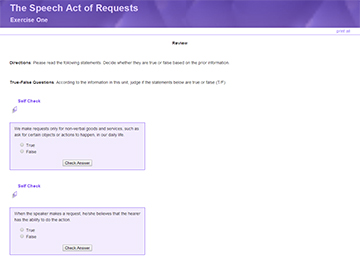Unit 1 Introduction
Unit 1 presents a brief introduction to the speech act of request and emphasizes the need for learning how to appropriately make requests in everyday communication. This unit also provides corresponding exercises for students to practice.
1.1 Goal of Unit 1
The goal of unit 1 is to engage students’ attention to the speech act of request and to make them understand the characteristics of request making. In addition, this unit provides students with examples that illustrate the use of requests in both American English and Chinese.
1.2 What is a Request?
Request making is an indispensable part of our everyday communication. None of us can survive by ourselves. We need other people’s help, and they need ours as well. We can make a request for non-verbal goods and services (e.g., an object and an action) or for verbal goods and services (e.g., giving information and granting permission) (Trosborg, 1995).
Like the expression of gratitude, a request is also a speech act. According to Searle (1979), a request is an attempt made by the speaker to get the hearer to do something, which usually benefits the speaker but costs something from the hearer. Below are some examples of English requests:
- I need your passport.
- Can I borrow your pen?
- It is really hot in the room.
Thinking: How do these three requests differ from each other?
Below are two examples of request making from the Chinese language:
1. 能给我一杯可乐吗?Nín néng gěi wǒ yì bēi kělè ma? Could you give me a cup of coke?
2. 我想要一杯可乐。Wǒ xiǎngyào yì bēi kělè. I would like a cup of coke.
1.3 Characteristics of Requests
Based on previous research findings about request making, some characteristics of requests are summarized below:
- A requested action must be within the hearer’s control: when the speaker makes a request to the hearer, the speaker believes the hearer is able to perform the action;
- A request takes place before the prospective act expected to be performed by the hearer, which is different from the expression of gratitude (i.e., the speaker expresses his/her appreciation for a past act);
- A request is a face-threatening act: the request may impinge on the hearer’s freedom of action and the speaker may fear to be refused. Thus the speaker always employs certain strategies to minimize the threats (Brown & Levinson, 1987);
- A request is different from a command: a request leaves options for the hearer to do the action or refuse to do it, while a command does not.
Thinking: Thinking back on what we learned about expressions of gratitude, how do requests differ from gratitude?
Review
Please click on the Review link for some True/False questions based on the information above.
